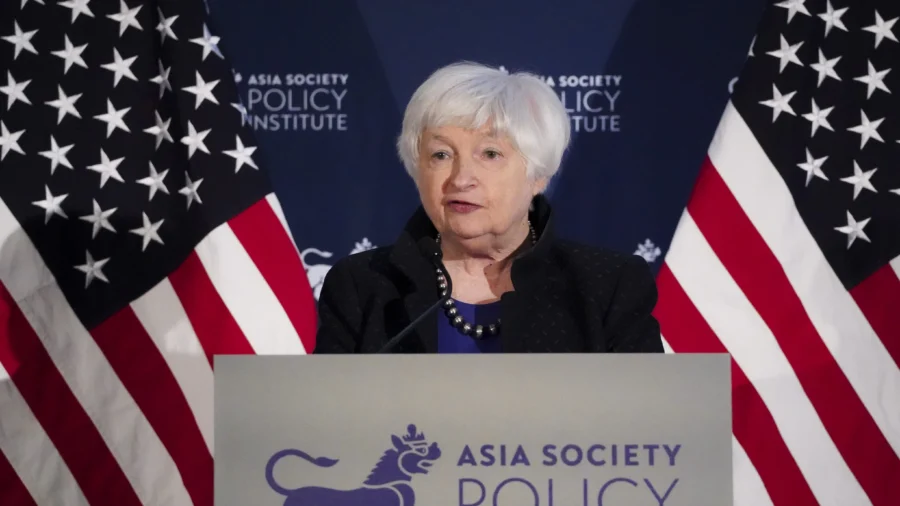A decoupling of the United States and China would have disastrous consequences for the global economy, according to Treasury Secretary Janet Yellen.
Ms. Yellen’s remarks come ahead of the much-anticipated Asia-Pacific Economic Cooperation summit in San Francisco. The White House confirmed that President Joe Biden would meet with Chinese regime leader Xi Jinping on the sidelines of the summit.
In a prepared address to the Asia Society in the nation’s capital on Nov. 2, Ms. Yellen set the stage for the much-anticipated meeting. She emphasized Washington’s “friendshoring” efforts in the Indo-Pacific region and reiterated the U.S. position of no longer relying on a single country, such as China, for imports.
Several administration officials have conducted face-to-face talks with Chinese officials this year, including Ms. Yellen, Secretary of State Antony Blinken, and Secretary of Commerce Gina Raimondo.
In recent weeks, the former chair of the Federal Reserve has asserted that the United States doesn’t seek to decouple from Beijing because it would have disastrous implications for the world and would be impractical.
“As I’ve said, the United States does not seek to decouple from China. A full separation of our economies, or an approach in which countries including those in the Indo-Pacific are forced to take sides, would have significant negative global repercussions,” Ms. Yellen said to the nonprofit organization that aims to strengthen partnerships between the United States and Asia.
“We have no interest in such a divided world and its disastrous effects. And given the extent of economic linkages within the Indo-Pacific region and the complexity of global supply chains, it’s also simply not practical.”
Still, the key objective for the United States is to diversify its trade partnerships by enhancing relationships with India, Singapore, Vietnam, and other Indo-Pacific states.
According to Ms. Yellen, trade with Vietnam has ballooned by nearly 25 percent over the past three decades, topping $140 billion in 2022. The U.S. government anticipates this will increase, particularly as the CHIPS and Science Act includes a $500 million fund for international investments.
“We are trading in substantial and rising amounts with the Indo-Pacific, so these shifts do not mean less trade, just a different pattern of flows of goods and services,” she added. “We’re generating diverse and secure supply chains, protecting our national security, and advancing our values while growing economies across the Indo-Pacific.”
Over the past year, the White House has been bolstering Washington’s reach in the region through the Indo-Pacific Economic Framework (IPEF). It’s aimed at expanding digital trade, promoting clean energy, engaging in corruption-free fair trade, and improving supply chains. This campaign was built in response to China’s Belt and Road Initiative, a global infrastructure development strategy that invests in more than 100 countries, including nations in the Indo-Pacific region, which represents 40 percent of the global GDP.
U.S. officials contend that Beijing has been looking to fill the void after Washington abandoned the Trans-Pacific Partnership in 2017. The IPEF is believed to be the trade agreement’s indirect successor.
De-risking or Decoupling
Ms. Yellen and other U.S. officials say the United States isn’t decoupling from China but rather “de-risking.” This plan aims to mitigate vulnerabilities and threats resulting from reliance on Chinese goods.
Census Bureau statistics reveal that the United States’ trade deficit with China exceeded $180 billion in the first eight months of 2023.
But de-risking is a “very ambiguous word” to use, according to Paul Gewirtz, a foreign policy expert at the Brookings Institution.
“But in reality, the word ‘de-risking’ is extremely ambiguous and its meaning uncertain,” Mr. Gewirtz wrote. “The word itself tells us very little about China policy. Its scope all depends on how the word is interpreted. Very likely, different countries will interpret and apply ‘de-risking’ differently, creating divergence and not consensus—in some countries producing a modest scope of economic separation, in some potentially a policy similar to ‘de-coupling.'”
Although much of the focus is on Washington’s potentially decoupling from China, what about the Chinese Communist Party divorcing itself from U.S. relations?
China hasn’t officially announced that it’s participating in decoupling plans. However, it has accelerated the decade-long de-dollarization initiative over the past year. In 2023, Beijing established multiple deals that settle bilateral trade in local currencies, such as the Chinese yuan.
In July, a Nikkei analysis of Society for Worldwide Interbank Financial Telecommunication data showed that the yuan was used in 49 percent of China’s cross-border transactions in the second quarter, surpassing the greenback for the first time on record. But the world’s second-largest economy still has a long way to go to dethrone the king dollar, as the buck continues to account for 42 percent of international trade. By comparison, the yuan represented less than 3 percent, sitting behind the British pound and the Japanese yen.
At the same time, the yuan’s share of global reserves declined in the second quarter. According to the International Monetary Fund’s Composition of Official Foreign Exchange Reserves, the Chinese yuan accounted for about 2 percent of total forex reserves in the April-to-June period.
Recent Treasury data found that China reduced its holdings of U.S. government debt, trimming its total to $805.4 billion in August. This is down more than 14 percent from the time a year ago.
Despite worldwide de-dollarization campaigns, a “practical replacement” to the chief international reserve currency is unlikely to form, according to Alan Robinson, a vice president at RBC Wealth Management.
“We don’t believe the dollar is at risk of losing its reserve currency status in the foreseeable future,” Mr. Robinson wrote in a research note. “And that’s a view that will be applauded by U.S. policymakers, as this status comes with a lot of benefits.”
The Chinese yuan has weakened considerably against the U.S. dollar this year, sliding by about 6 percent so far.
From The Epoch Times


